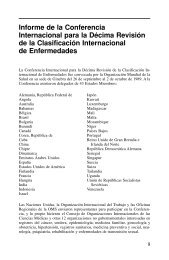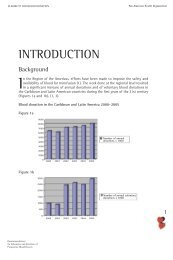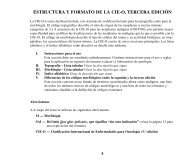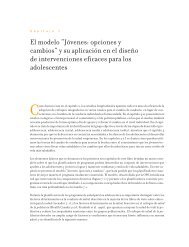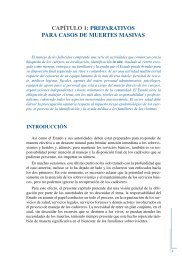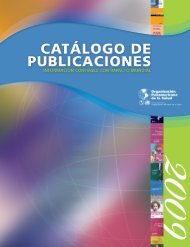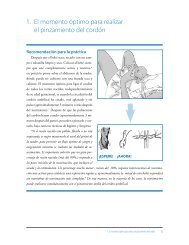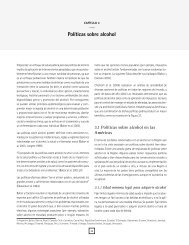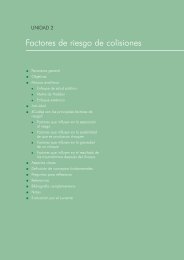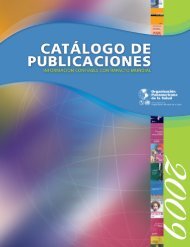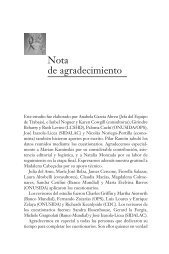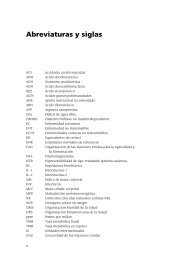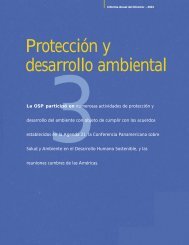Health Promotion and Protection - PAHO Publications Catalog
Health Promotion and Protection - PAHO Publications Catalog
Health Promotion and Protection - PAHO Publications Catalog
Create successful ePaper yourself
Turn your PDF publications into a flip-book with our unique Google optimized e-Paper software.
Annual Report of the Director – 2001<br />
<strong>Health</strong> <strong>Promotion</strong><br />
<strong>and</strong> <strong>Protection</strong><br />
1<br />
PASB directed much of its technical cooperation toward<br />
creating a new culture of health promotion <strong>and</strong> protection that<br />
views health as a social value.
<strong>Health</strong> <strong>Promotion</strong> <strong>and</strong> <strong>Protection</strong><br />
The Bureau pursued this goal by promoting a broad concept of health as the basis for<br />
human development <strong>and</strong> for an acceptable quality of life, <strong>and</strong> by encouraging Member<br />
States to pursue the five action areas or strategies of health promotion: establishing<br />
healthy public policies, creating supportive environments for health, empowering<br />
communities, developing personal skills, <strong>and</strong> reorienting health services.<br />
A growing number of countries in the Region have recognized the importance of<br />
health promotion as a powerful public health strategy <strong>and</strong> have incorporated many<br />
of these action areas in their national health plans <strong>and</strong> programs. These advances<br />
have been achieved through active collaboration among national governments, nongovernmental<br />
organizations (NGOs), national <strong>and</strong> international institutions, <strong>and</strong> communities.<br />
Although progress has been made toward many of the goals of “health for<br />
all,” challenges remain.<br />
The Fifth Global Conference for <strong>Health</strong> <strong>Promotion</strong>—”<strong>Health</strong> <strong>Promotion</strong>: Bridging<br />
the Equity Gap”—held in June 2000 in Mexico City, built on the advances of the four<br />
previous international health promotion conferences (Ottawa, 1986; Adelaide, 1988;<br />
Sundsvall, 1991; Jakarta, 1997). This conference brought together 100 countries to review<br />
the lessons learned since the first conference was held in Ottawa <strong>and</strong> to renew<br />
the commitment to promote the health of the world’s people, to increase intersectoral<br />
collaboration, <strong>and</strong> to improve the infrastructure for health promotion. Ministerial<br />
delegations from almost all of the countries of the Region of the Americas participated<br />
<strong>and</strong> all signed the “Ministerial Statement for the <strong>Promotion</strong> of <strong>Health</strong>: From<br />
Ideas to Action,” also known as the Mexico Declaration. In signing the Declaration,<br />
<strong>PAHO</strong> Member States have committed themselves to strengthening health promotion<br />
planning by making health promotion a fundamental priority in local, regional, national,<br />
<strong>and</strong> international policies <strong>and</strong> programs; taking a leadership role to ensure<br />
that all government sectors <strong>and</strong> actors in civil society participate in the implementation<br />
of health promotion activities that strengthen <strong>and</strong> exp<strong>and</strong> partnerships for<br />
health; using every means available to support the preparation of nationwide health<br />
promotion plans of action tailored to each country’s circumstances; establishing or<br />
strengthening national <strong>and</strong> international networks to promote health; advocating<br />
that UN agencies be accountable for the impact on health of their development<br />
agenda; <strong>and</strong> informing the Director General of the World <strong>Health</strong> Organization of the<br />
progress made in the performance of the above actions so she can report on this to<br />
the 107th session of WHO’s Executive Board.<br />
A strategic planning process involving PASB, the Caribbean Food <strong>and</strong> Nutrition Institute<br />
(CFNI), the Latin American Center for Perinatology <strong>and</strong> Human Development,<br />
<strong>and</strong> the Institute of Nutrition of Central America <strong>and</strong> Panama (INCAP) was initiated to<br />
integrate the technical areas within a conceptual <strong>and</strong> methodological framework for<br />
health promotion. Underst<strong>and</strong>ing of the basic determinants of health inequities has<br />
improved significantly, yet social <strong>and</strong> economic inequities in the Region continue to<br />
A young man’s lifestyle choices in<br />
adolescence will have far-reaching<br />
consequences throughout his life:<br />
staying active <strong>and</strong> avoiding risky<br />
behaviors are like buying health<br />
insurance for adulthood <strong>and</strong> old age.<br />
PASB has worked actively with Member<br />
States, as well as in partnership with<br />
other international agencies <strong>and</strong><br />
nongovernmental organizations, to<br />
sponsor healthy policies <strong>and</strong> advocate<br />
for legislation that protects adolescents’<br />
rights. In addition, by encouraging the<br />
wide use of life skills training, many of<br />
the young in the Americas have been<br />
empowered to take charge of their own<br />
health <strong>and</strong> sprint into a healthy future.<br />
3
Annual Report of the Director – 2001<br />
PROMOTING HEALTH IN THE AMERICAS<br />
Pan American <strong>Health</strong> Organization<br />
<strong>PAHO</strong>’s Representative in Canada Speaks Out on <strong>Health</strong> Issues<br />
As <strong>PAHO</strong>’s representative in Canada, the Canadian Society for International <strong>Health</strong> (CSIH) has vigorously<br />
fought to focus attention on health issues. To publicize PASB’s work, CSIH organized a presentation<br />
on equity <strong>and</strong> health by Dr. George A.O. Alleyne, the Bureau’s Director. The presentation<br />
was well covered by the media <strong>and</strong> also drew representatives from several NGOs. CSIH celebrated<br />
World <strong>Health</strong> Day with a special ceremony <strong>and</strong> a forum to discuss this year’s theme, “Safe Blood<br />
Saves Lives.” The gathering provided an opportunity to distribute <strong>PAHO</strong>/WHO information kits on<br />
the issue to public health clinics, blood clinics, hospitals, health care associations, <strong>and</strong> government<br />
officials throughout Canada. Finally, the Society sponsored study tours of Canada for high-level<br />
health sector officials from the ministries of health of Bolivia, Honduras, Mexico, <strong>and</strong> Peru.<br />
In a press conference held in Ottawa, CSIH joined several other international organizations to<br />
plead for a quicker <strong>and</strong> more effective response to the growing worldwide crisis of children with<br />
HIV/AIDS. The Society also organized a media breakfast at the National Press Club to further publicize<br />
the issue. Representatives from television stations, Radio Canada, the Medical Post, <strong>and</strong> the<br />
Canadian Medical Association Journal attended the event, as did the upper echelons of <strong>Health</strong><br />
Canada <strong>and</strong> members of the AIDS community.<br />
erode health conditions for many population groups. For this reason, health promotion<br />
must continue to focus on bridging equity gaps among <strong>and</strong> within countries.<br />
Building <strong>Health</strong>y Public Policy<br />
Public policies in all sectors influence the determinants of health <strong>and</strong> are important<br />
vehicles for reducing social <strong>and</strong> economic inequities, for example, by ensuring equitable<br />
access to goods <strong>and</strong> services, among them health care. The Regional <strong>Health</strong>y<br />
Public Policy Initiative relies on a multisectoral approach for ensuring the sustainability<br />
of services; increasing protection <strong>and</strong> reducing risks; increasing care to indigenous<br />
groups; enhancing coverage <strong>and</strong> impact at the local level; <strong>and</strong> improving quality of<br />
life. Some countries have assessed their policy, analysis, <strong>and</strong> development needs, <strong>and</strong><br />
this information, in turn, has strengthened the governments’ capacity to participate<br />
in the initiative.<br />
In Chile, for example, health promotion has been established as a State policy <strong>and</strong><br />
is strongly supported by the President <strong>and</strong> by most government sectors. Led by the<br />
Ministry of <strong>Health</strong> <strong>and</strong> with support from PASB, 24 national agencies work together<br />
through the National Council for <strong>Health</strong> <strong>Promotion</strong>, known as “VIDA CHILE.” This intersectoral<br />
entity sets strategic lines of work for health promotion, <strong>and</strong> ensures that<br />
4
<strong>Health</strong> <strong>Promotion</strong> <strong>and</strong> <strong>Protection</strong><br />
there is sufficient political commitment in the country to launch <strong>and</strong> sustain health<br />
promotion activities. Local intersectoral councils also have been established in the<br />
country’s regions. The intersectoral body relies on information dissemination, social<br />
communication, <strong>and</strong> human resources training to fulfill its m<strong>and</strong>ate of strengthening<br />
health promotion <strong>and</strong> enhancing quality-of-life efforts undertaken by each sector.<br />
VIDA CHILE designed a communication campaign to promote healthy nutrition <strong>and</strong><br />
underscore the importance that physical activity has for health. The private sector,<br />
NGOs, scientific organizations, <strong>and</strong> universities have joined in the campaign, which<br />
significantly extends the reach of the message. In November, VIDA CHILE submitted<br />
the national goals for health promotion for 2000–2006 to Chile’s President; PASB was<br />
actively involved in establishing these goals.<br />
The focus on healthy public policies is timely, as most countries are reforming various<br />
sectors, particularly health <strong>and</strong> education, <strong>and</strong> are incorporating health promotion<br />
in this process. During 2000, PASB’s technical cooperation in health promotion<br />
has supported the ministries of health <strong>and</strong> other agencies at the national <strong>and</strong> regional<br />
levels in establishing healthy public policies. The development of legislation favoring<br />
healthy public policies has been one way of addressing the Region’s health priorities.<br />
Six countries in the Region have implemented policies to facilitate delivery of integrated<br />
adolescent care. In addition, the Bureau actively participated in the discussion<br />
<strong>and</strong> formulation of laws to protect the sexual <strong>and</strong> reproductive health rights established<br />
in the constitutions of 14 countries in the Region, <strong>and</strong> many countries have developed<br />
laws to guarantee access to sexual <strong>and</strong> reproductive health information <strong>and</strong><br />
services. Venezuela has enacted comprehensive laws that protect children <strong>and</strong> adolescents<br />
<strong>and</strong> establish their right to sexual <strong>and</strong> reproductive health education. These<br />
laws aim to increase access to services <strong>and</strong> programs <strong>and</strong> ensure confidentiality. In addition,<br />
laws establishing national intersectoral youth programs have been incorporated<br />
into the framework of child <strong>and</strong> adolescent health <strong>and</strong> social policies, <strong>and</strong> a<br />
minimum age limit of 18 years was established for the purchase of cigarettes. These<br />
laws require all cigarette packaging to include a health warning covering 20% of the<br />
package’s surface area.<br />
PASB’s technical cooperation in adolescent health utilizes a conceptual framework<br />
for human development <strong>and</strong> health promotion; the Bureau has contributed to<br />
healthy policies <strong>and</strong> advocacy in Central America by conducting a seminar on health<br />
policy, equity, <strong>and</strong> youth in El Salvador. PASB has actively supported the countries in<br />
order to generate consensus <strong>and</strong> put adolescent health on the agenda of the United<br />
Nations Special Session on Children, to be held in September 2001. The Bureau’s technical<br />
cooperation was also key to the incorporation of adolescent health issues in the<br />
Fifth Ministerial Meeting on Children <strong>and</strong> Social Policies in the Americas, held in October<br />
2000 in Jamaica, <strong>and</strong> in the Kingston Consensus on Children <strong>and</strong> Social Policy in<br />
the Americas that resulted from the meeting.<br />
5
Annual Report of the Director – 2001<br />
PROMOTING HEALTH IN THE AMERICAS<br />
Pan American <strong>Health</strong> Organization<br />
PASB, in collaboration with The George Washington University’s Center for International<br />
<strong>Health</strong>, conducted case studies of policies affecting adolescents <strong>and</strong> youths,<br />
which were published in Colombia, the Dominican Republic, <strong>and</strong> Nicaragua. The Central<br />
American countries, as part of the project on adolescent sexual <strong>and</strong> reproductive<br />
health conducted by <strong>PAHO</strong> <strong>and</strong> the Swedish International Development Cooperation<br />
Agency (SIDA), have formed an intersectoral committee on adolescence to formulate<br />
policies on adolescence <strong>and</strong> youth. The Dominican Republic, with PASB’s support,<br />
passed the Law of Youth <strong>and</strong> allocated 1% of the national budget <strong>and</strong> 4% of municipal<br />
budgets for its implementation. This process was carried out with the participation<br />
of various sectors <strong>and</strong> of young people themselves. The Central American Seminar<br />
on Policy <strong>and</strong> Equity was also held with the support of the <strong>PAHO</strong>-SIDA project.<br />
With the Bureau’s support, Antigua, Bahamas, Barbados, British Virgin Isl<strong>and</strong>s, Dominica,<br />
Grenada, Guyana, Jamaica, <strong>and</strong> Saint Lucia participated in the survey of adolescents<br />
published recently in A Portrait of Adolescent <strong>Health</strong> in the Caribbean, which<br />
is being effectively used as an advocacy tool <strong>and</strong> a model for the use of research in<br />
policymaking <strong>and</strong> programming.<br />
One of the most significant public policy developments in health promotion was<br />
the beginning of negotiations on the Framework Convention on Tobacco Control, the<br />
first international health treaty of this kind, which has been developed under the auspices<br />
of WHO. Approximately 25 countries in the Region have participated in this<br />
process. PASB provided technical cooperation <strong>and</strong> funding to help the countries prepare<br />
for the negotiations on the Framework Convention on Tobacco Control.<br />
In 2000, significant tobacco policy developments in the countries included Brazil’s<br />
passage of wide-ranging restrictions on tobacco advertising, which are now the most<br />
comprehensive in Latin America. Canada introduced new health messages that cover<br />
half the surface area of tobacco packaging <strong>and</strong> provide advice to smokers.<br />
PASB supported the promotion <strong>and</strong> monitoring of public policies for iodine fortification<br />
of salt to ensure the elimination of iodine-deficiency-related disorders in Bolivia,<br />
Chile, the Dominican Republic, <strong>and</strong> Panama. By improving the monitoring <strong>and</strong><br />
surveillance systems <strong>and</strong> ensuring the quality of iodized salt, this effort will help guarantee<br />
the sustainability of fortification programs. At present, 97% of the population<br />
in Bolivia, over 95% in Chile, less than 40% in the Dominican Republic, <strong>and</strong> over 90%<br />
in Panama consume iodized salt.<br />
Technical cooperation was provided to several countries to implement vitamin A<br />
supplementation, significantly increasing coverage of at least the first dose (Figures 1<br />
<strong>and</strong> 2). The implementation status of national food <strong>and</strong> nutrition plans in the Region<br />
was reviewed <strong>and</strong> information was gathered from 18 Spanish-speaking countries.<br />
Eleven countries’ plans have been approved <strong>and</strong> are being implemented, four countries<br />
have formulated plans, <strong>and</strong> three countries as yet have no plan.<br />
PASB supported the analysis of nutritional status <strong>and</strong> equity in Ecuador <strong>and</strong> of<br />
health <strong>and</strong> equity in eight other countries in order to help them develop healthy pub-<br />
6
<strong>Health</strong> <strong>Promotion</strong> <strong>and</strong> <strong>Protection</strong><br />
FIGURE 1. Vitamin A supplementation coverage of children 6–11 months of age,<br />
1998–2000.<br />
100<br />
80<br />
60<br />
(%)<br />
40<br />
20<br />
0<br />
Bolivia Brazil Dominican<br />
Republic<br />
Ecuador Guatemala Honduras Nicaragua Panama Peru<br />
1998 1999 2000<br />
FIGURE 2. First dose of Vitamin A coverage of children 1 year old <strong>and</strong> older,<br />
1998–2000.<br />
100<br />
80<br />
60<br />
(%)<br />
40<br />
20<br />
0<br />
Bolivia Brazil Dominican<br />
Republic<br />
Ecuador Guatemala Honduras Nicaragua Panama Peru<br />
1998 1999 2000<br />
lic policies to address internal inequities. The Bureau also promoted <strong>and</strong> supported<br />
the evaluation of Chile’s program to fortify flour with folic acid in order to demonstrate<br />
this effort’s contribution to the reduced incidence of neural tube defects.<br />
As a contribution to the development of healthy public policies on breastfeeding,<br />
the article “Length of Exclusive Breastfeeding: Linking Biology <strong>and</strong> Scientific Evidence<br />
to a Public <strong>Health</strong> Recommendation” was published in the Journal of Nutrition <strong>and</strong> a<br />
chapter was produced for a book on the short- <strong>and</strong> long-term effects of breastfeed-<br />
7
Annual Report of the Director – 2001<br />
PROMOTING HEALTH IN THE AMERICAS<br />
Pan American <strong>Health</strong> Organization<br />
Enlisting the Media to Promote <strong>Health</strong><br />
The Office of Caribbean Program Coordination (CPC) has been one of <strong>PAHO</strong>’s most active country<br />
offices in using strategic social communication to support its technical cooperation interventions.<br />
During 2000, the CPC continued to grant its Awards for Excellence in Journalism to journalists<br />
<strong>and</strong> other media workers in the English-speaking Caribbean who did outst<strong>and</strong>ing work for health.<br />
Over the years, these awards have increased the reach of health messages among the people of the<br />
English-speaking Caribbean, <strong>and</strong> in doing so, have increased their capacity to make healthy lifestyle<br />
choices.<br />
The awards, which have been h<strong>and</strong>ed out since 1992, are designed to increase awareness of<br />
health <strong>and</strong> environmental issues by encouraging the publication or broadcast of news items, features,<br />
documentaries, <strong>and</strong> other materials on these subjects; recognize the contribution of national<br />
<strong>and</strong> regional journalists in putting health <strong>and</strong> the environment on the public agenda; improve the<br />
coverage of health <strong>and</strong> environmental issues; <strong>and</strong> increase awareness of the importance of international<br />
cooperation in health in general <strong>and</strong> PASB’s contribution in particular.<br />
The effort to promote health through these awards involves a partnership coalition that includes<br />
the governments of the Region, particularly individual ministries such as the ministries of health, of<br />
the environment, of labor <strong>and</strong> social transformation, <strong>and</strong> of education, as well as parts of the private<br />
sector. <strong>PAHO</strong>’s Office of Caribbean Program Coordination is firmly committed to actively participate<br />
in the partnership among the health sector, media professionals, UN agencies, the private sector,<br />
<strong>and</strong> the community at large, believing that this is an effective way to enhance the state of health<br />
<strong>and</strong> well-being in the communities of the English-speaking Caribbean.<br />
ing on child health. In addition, PASB organized a technical consultation on the recommended<br />
length of exclusive breastfeeding in August 2000, <strong>and</strong> invited experts in<br />
the field from the Region.<br />
To contribute to the cost-effective purchase <strong>and</strong> consumption of highly nutritious<br />
foods, PASB published “La Mejor Compra” (The Best Purchase) for dissemination<br />
throughout the Region. “La Mejor Compra” contains a software package <strong>and</strong> guidelines<br />
on how to use the media <strong>and</strong> other channels to promote the best nutritional values<br />
at the lowest cost in a specific region during specific times of year.<br />
With technical support from PASB, Ecuador’s Ministry of Public <strong>Health</strong> formally<br />
launched its national food <strong>and</strong> nutrition program, which targets children under 2<br />
years of age, as well as pregnant <strong>and</strong> breastfeeding women. The program, developed<br />
jointly by PASB <strong>and</strong> the Ministry, contains components that rely on health promotion<br />
to address public policy issues, community activities, the development of life skills, <strong>and</strong><br />
the reorientation of health services to ensure that appropriate health messages are<br />
linked to food provision.<br />
8
<strong>Health</strong> <strong>Promotion</strong> <strong>and</strong> <strong>Protection</strong><br />
Five countries have implemented healthy public policies in the area of nutrition,<br />
focusing on national food security <strong>and</strong> micronutrient supplementation. Panama carried<br />
out national surveys <strong>and</strong> utilized the data collected to review its micronutrient<br />
supplementation strategies <strong>and</strong> to work toward certifying the country as free of iodine<br />
deficiency.<br />
Also in 2000, PASB held a series of subregional forums to examine <strong>and</strong> promote<br />
technical collaboration among countries to develop national policies to promote the<br />
health <strong>and</strong> well-being of the elderly. The Central American Forum on <strong>Health</strong> <strong>and</strong><br />
Aging was held in El Salvador in collaboration with the Ministry of Public <strong>Health</strong>, the<br />
National Secretariat of the Family, the Office of the First Lady, <strong>and</strong> Spain’s Institute of<br />
Migration <strong>and</strong> Social Services.<br />
The Bahamas, Bolivia, Brazil, Chile, Costa Rica, Dominica, El Salvador, Mexico, <strong>and</strong><br />
Peru developed policies that address quality of life issues for older persons. These policies<br />
use a multisectoral approach to promote the participation of nongovernmental<br />
organizations <strong>and</strong> other civil society actors, <strong>and</strong> address health inequities <strong>and</strong> poverty<br />
as major risk factors for poor health in the elderly. Peru <strong>and</strong> Chile collaborated technically<br />
to draft Peru’s national policy, which focuses on healthy aging <strong>and</strong> on the contributions<br />
that various sectors of society make toward a dignified old age. Technical<br />
collaboration between Canada <strong>and</strong> Mexico has significantly advanced the development<br />
of a model of healthy public policy for aging. This model will be tested in both<br />
countries <strong>and</strong> used as part of an ongoing effort to develop the necessary building<br />
blocks for establishing a public policy on healthy aging. The Caribbean Charter on<br />
<strong>Health</strong> <strong>and</strong> Aging has fostered the adoption of national policies oriented toward<br />
health promotion in various countries; Dominica’s <strong>and</strong> the Bahamas’ national policies<br />
are good examples.<br />
To address these priorities, Brazil, Canada, Chile, Costa Rica, Jamaica, Mexico, Panama,<br />
Suriname, Trinidad <strong>and</strong> Tobago, <strong>and</strong> the United States have developed public<br />
policies for mental health <strong>and</strong> have empowered communities to care for the mentally<br />
ill, sensitizing police <strong>and</strong> security forces to the needs of this group, <strong>and</strong> enacting legislation<br />
to protect the human rights of the mentally ill.<br />
Domestic violence <strong>and</strong> violence against women have been increasing in the Region,<br />
<strong>and</strong> four countries have responded with public policies to address these concerns.<br />
Strategies for combating domestic violence include putting this problem on the public<br />
agenda, strengthening multisectoral coordination between government sectors<br />
<strong>and</strong> nongovernmental actors, <strong>and</strong> providing support to women’s groups.<br />
Acknowledging the link between environmental conditions <strong>and</strong> health outcomes,<br />
in 2000, several countries in the Region formulated policies <strong>and</strong> st<strong>and</strong>ards to guide future<br />
economic <strong>and</strong> developmental activities in ways that consider the health impact<br />
of environmental changes.<br />
In working with Member States to<br />
launch nutrition-related social<br />
communication campaigns, PASB<br />
also has relied on health promotion<br />
techniques to effectively improve the<br />
nutritional status of the population. For<br />
example, the Bureau has put together<br />
an information packet showing how<br />
to best tap the media <strong>and</strong> other<br />
channels to promote food that yields<br />
the best nutritional values at the<br />
lowest possible cost.<br />
9
Annual Report of the Director – 2001<br />
PROMOTING HEALTH IN THE AMERICAS<br />
Pan American <strong>Health</strong> Organization<br />
<strong>Health</strong> promoting schools hold<br />
the best promise for developing<br />
future citizens who will care for<br />
their health <strong>and</strong> that of their loved<br />
ones <strong>and</strong> who will be responsible<br />
stewards of their environment.<br />
In health promoting schools, the<br />
health <strong>and</strong> education sectors come<br />
together to promote healthy habits,<br />
self-esteem, <strong>and</strong> environmental health<br />
among the students.<br />
<strong>Health</strong> promotion needs assessments carried out in the countries identified key issues<br />
for intersectoral collaboration. In Trinidad <strong>and</strong> Tobago, training needs in the area of<br />
public policy analysis <strong>and</strong> development were assessed among senior staff at the Ministry<br />
of <strong>Health</strong>. The objective was to obtain information about training needs <strong>and</strong> to<br />
strengthen the Ministry’s capacity to lead healthy public policy initiatives <strong>and</strong> to participate<br />
with other sectors in joint efforts in this regard. The results highlighted the need<br />
for negotiation skills to build consensus among stakeholders <strong>and</strong> for the adoption of a<br />
multisectoral approach. Based on the assessment’s findings, three policy documents<br />
dealing with noncommunicable disease control <strong>and</strong> prevention, tobacco consumption<br />
control <strong>and</strong> prevention, <strong>and</strong> sexual <strong>and</strong> reproductive health care were drafted with<br />
PASB’s support <strong>and</strong> are being submitted to the Ministry of <strong>Health</strong> for approval.<br />
The Bureau has actively participated in monitoring the fulfillment of the commitments<br />
undertaken at the 1990 World Summit for Children <strong>and</strong> has contributed to the<br />
evaluation of the achievements <strong>and</strong> to the political <strong>and</strong> strategic situation analysis of<br />
infant health in the Region. An ongoing advocacy effort by UN agencies, NGOs, academic<br />
institutions, <strong>and</strong> others to incorporate health promotion in public policies dealing<br />
with children <strong>and</strong> adolescents is under way in the countries. These efforts have led<br />
to the signing of the Kingston Consensus <strong>and</strong> to preparatory meetings for the United<br />
Nations Special Session on Children, which were held in January 2001, where children’s<br />
health was central to the agenda of the countries in the Region.<br />
PASB made substantive contributions to the construction of conceptual health promotion<br />
frameworks that highlight the importance of biological, psychological, <strong>and</strong><br />
social determinants of health <strong>and</strong> quality of life of children <strong>and</strong> adolescents. The role<br />
of supportive environments (family, community, school, municipalities) for comprehensive<br />
childhood development was clearly demonstrated, as was the need for accessible,<br />
quality health services with a health promotion approach.<br />
Maternal mortality continues to be a major public health challenge in the Region<br />
of the Americas. A significant event in 2000 was the consolidation of the Regional Interagency<br />
Task Force on Maternal Mortality Reduction, which is a partnership among<br />
<strong>PAHO</strong>, the World Bank, IDB, USAID, UNICEF, UNFPA, Family Care International, <strong>and</strong> the<br />
Population Council. This task force was born of the lessons learned from the past<br />
decade, particularly that partnerships can produce positive changes. As its technical<br />
secretariat, PASB played a key role in bringing this task force to action, building consensus<br />
on strategies <strong>and</strong> effective interventions based on lessons learned, <strong>and</strong> creating<br />
a common vision for the reorientation of public policies aimed at reducing maternal<br />
mortality.<br />
In conjunction with PASB <strong>and</strong> CDC, the Member States met to assess epidemiological<br />
surveillance systems for maternal mortality in 26 countries of the Region, <strong>and</strong><br />
found that since 1995, most have improved these systems.<br />
10
<strong>Health</strong> <strong>Promotion</strong> <strong>and</strong> <strong>Protection</strong><br />
PASB, in collaboration with the countries, is improving the information <strong>and</strong> surveillance<br />
systems that will supply evidence on tobacco use <strong>and</strong> tobacco-related deaths<br />
to be used in policy development. The Bureau continued to collaborate with WHO<br />
<strong>and</strong> CDC to support implementation of the Global Youth Tobacco Survey in several<br />
Latin American <strong>and</strong> English-speaking Caribbean countries, which included two regional<br />
training sessions on conducting the survey.<br />
The Bureau published a study of tobacco use in Latin America <strong>and</strong> North America<br />
<strong>and</strong> began work on a study of tobacco use in the Caribbean <strong>and</strong> on mortality caused<br />
by tobacco throughout the Region. The latter two studies will be published in 2001.<br />
Preliminary data from 1989 on tobacco-caused mortality in the Americas show a far<br />
greater impact than previously thought, with an estimated 845,000 deaths caused by<br />
tobacco every year. It is likely that the current annual death toll in the Region from<br />
tobacco approaches one million.<br />
Creating Supportive Environments<br />
The Sundsvall Statement on Supportive Environments for <strong>Health</strong> (Third International<br />
Conference on <strong>Health</strong> <strong>Promotion</strong>, Sundsvall, Sweden, June 1991) addresses the creation<br />
of supportive environments—the physical <strong>and</strong> psychosocial aspects of where people<br />
live, work, <strong>and</strong> play. It also encompasses the framework that determines access to<br />
resources <strong>and</strong> opportunities for empowerment. During 2000, PASB’s technical cooperation<br />
enabled countries to create supportive environments, considering their interrelated<br />
physical, social, spiritual, economic, <strong>and</strong> political dimensions. Coordinated actions<br />
at local, regional, national, <strong>and</strong> global levels were effective in achieving sustainable solutions.<br />
The Bureau collaborated with 17 countries during 2000, mainly on the initiatives<br />
highlighted below.<br />
<strong>Health</strong> Promoting Schools<br />
The establishment of a health promoting school is a social development process that<br />
provides a comprehensive response to children’s biological, psychological, <strong>and</strong> social<br />
needs. The <strong>Health</strong> Promoting Schools Initiative focused on disseminating information<br />
on <strong>and</strong> ensuring the rights of children <strong>and</strong> adolescents to health <strong>and</strong> education, including<br />
sexual <strong>and</strong> reproductive health, life skills, family life education, interfamily<br />
communication, exercise, <strong>and</strong> healthy lifestyles. Technical collaboration included reviewing<br />
<strong>and</strong> updating school health policies, establishing <strong>and</strong>/or strengthening intersectoral<br />
coordination between the health <strong>and</strong> education sectors, <strong>and</strong> committing to<br />
11
Annual Report of the Director – 2001<br />
PROMOTING HEALTH IN THE AMERICAS<br />
Pan American <strong>Health</strong> Organization<br />
the incorporation of health promotion in school curricula, particularly when training<br />
teachers in life skills education. PASB also collaborated with UNICEF <strong>and</strong> UNESCO to<br />
incorporate life skills education in the Education for All Initiative, undertaken at the<br />
World Conference on Education for All in Jomtien, Thail<strong>and</strong>, in 1990.<br />
Most countries have established intersectoral <strong>and</strong> interinstitutional committees in<br />
which all social sectors actively participate to discuss problems <strong>and</strong> suggest solutions.<br />
As a result, domestic violence <strong>and</strong> other problems that affect children <strong>and</strong> adolescents<br />
are increasingly visible <strong>and</strong> are being addressed as priority issues.<br />
FIGURE 3. Number of healthy municipalities, selected<br />
countries, 1995 <strong>and</strong> 2000.<br />
No. municipalities<br />
200<br />
100<br />
0<br />
Bolivia<br />
Brazil<br />
Colombia<br />
Chile<br />
Cuba<br />
Dominican<br />
Republic<br />
Ecuador<br />
El Salvador<br />
Guatemala<br />
Honduras<br />
Mexico<br />
1995 2000<br />
<strong>Health</strong>y Municipalities<br />
In 2000, PASB collaborated with 13 countries to promote healthy municipalities.<br />
Figures 3 <strong>and</strong> 4 illustrate the evolution of healthy municipalities from 1995 to 2000<br />
in selected countries. In Mexico, the healthy municipality movement has developed<br />
dynamically <strong>and</strong> steadily <strong>and</strong> is considered a key national strategy to promote intersectoral<br />
collaboration, community participation, dissemination of health <strong>and</strong> public<br />
policy information, <strong>and</strong> creation of healthy spaces. PASB provided technical cooperation<br />
<strong>and</strong> mobilized national <strong>and</strong> international resources for the consolidation of the<br />
healthy community network’s strategies <strong>and</strong> projects.<br />
In Argentina, several municipalities have worked with NGOs, schools, governmental<br />
<strong>and</strong> educational institutions, ecological groups, <strong>and</strong> the Red Cross, to implement strategies<br />
to improve infant, adolescent, <strong>and</strong> maternal health; reduce malnutrition; create<br />
microenterprises <strong>and</strong> community gardens; <strong>and</strong> establish radio networks to assist in the<br />
dissemination of health promotion <strong>and</strong> protection messages.<br />
PASB provided technical cooperation to establish healthier environments<br />
in jails.<br />
In Cuba, a model program for adolescents <strong>and</strong> young adults in<br />
~1540 the healthy municipality of Horquitas (Cienfuegos) involves community<br />
members <strong>and</strong> young people in managing the program.<br />
~670<br />
In Chile, health promotion was strengthened through the<br />
creation of intersectoral health promotion committees in 60%<br />
of the country’s municipalities. The mayors played a leading<br />
role in ensuring political support <strong>and</strong> mobilizing resources.<br />
In Jamaica, the creation of healthy spaces has been broadened<br />
to include the Inter-Church Association of <strong>Health</strong>, Healing,<br />
<strong>and</strong> Counseling Ministries, thereby exp<strong>and</strong>ing the churches’<br />
health <strong>and</strong> healing programs to include health promotion in<br />
their services.<br />
As part of the Caribbean Tourism <strong>Health</strong>, Safety, <strong>and</strong> Resource<br />
Conservation Project, which is a joint venture among<br />
Peru<br />
Venezuela<br />
12
<strong>Health</strong> <strong>Promotion</strong> <strong>and</strong> <strong>Protection</strong><br />
<strong>PAHO</strong>, CAREC, the Caribbean Hotel Association, <strong>and</strong> Caribbean<br />
Action for Sustainable Tourism, a number of workshops on the<br />
need for continued vigilance in preparing <strong>and</strong> serving healthy<br />
food both to the local population <strong>and</strong> to foreign visitors were<br />
conducted for hotel <strong>and</strong> restaurant personnel <strong>and</strong> for street<br />
food vendors. The workshops provided information to management<br />
<strong>and</strong> staff on cost-effective steps to improve food <strong>and</strong><br />
beverage preparation practices <strong>and</strong> to eliminate unsanitary<br />
<strong>and</strong> unhygienic practices among catering industry personnel.<br />
Work was done in collaboration with the various national ministries<br />
<strong>and</strong> agencies, <strong>and</strong> private sector groups, which resulted<br />
in the staging of several workshops on food safety in the tourism<br />
industry.<br />
In collaboration with the ministries of health of the Bahamas<br />
<strong>and</strong> of Uruguay, PASB has been addressing the challenge of improving<br />
physical <strong>and</strong> psychosocial conditions in long-term care<br />
facilities for the elderly. The Bureau has provided technical cooperation<br />
for the review of regulatory <strong>and</strong> monitoring systems<br />
as well as for training workshops for caregivers. The lessons<br />
learned will be useful to other countries.<br />
FIGURE 4. Municipalities participating in the <strong>Health</strong>y<br />
Municipality Movement (%), selected countries, 1995<br />
<strong>and</strong> 2000.<br />
Participating municipalities<br />
30<br />
20<br />
10<br />
0<br />
~46 ~64<br />
Bolivia<br />
Brazil<br />
Colombia<br />
Chile<br />
Cuba<br />
Dominican<br />
Republic<br />
Ecuador<br />
El Salvador<br />
Guatemala<br />
1995 2000<br />
Mexico<br />
Peru<br />
Mexico’s <strong>Health</strong>y Municipalities Movement Soars<br />
Beginning in the 1990s, PASB began to promote the creation of healthy municipalities in the Region,<br />
believing it to be a strategy that held great promise for improving health at the community level. In<br />
Mexico, healthy municipalities have burgeoned since the movement’s inception, <strong>and</strong> at this time, the<br />
country has close to 1,500 municipalities registered with the program coordinated by the Secretariat<br />
of <strong>Health</strong>. Many of the Mexican healthy municipalities fall along the perimeter of ancient Aztec settlements,<br />
which, in turn, were established according to sound ecological considerations.<br />
In becoming a healthy municipality, a community engages in various activities, such as the development<br />
of healthy policies, enlisting its members’ participation <strong>and</strong> self-management, the creation of<br />
healthy environments, <strong>and</strong> the reorientation of community health services so as to improve the population’s<br />
access to them. <strong>Health</strong>y municipalities in Mexico have undertaken citizen education campaigns<br />
to protect the environment <strong>and</strong> improve basic sanitation, projects to improve quality of life<br />
<strong>and</strong> the physical <strong>and</strong> social environment, activities to prevent drug addiction, <strong>and</strong> the establishment<br />
of investment policies designed to improve the quality of life for special groups affected by various<br />
inequities. The health of the communities will continue to improve as the citizens increasingly gain<br />
control of the future of their municipalities <strong>and</strong> cities.<br />
13
Annual Report of the Director – 2001<br />
PROMOTING HEALTH IN THE AMERICAS<br />
Pan American <strong>Health</strong> Organization<br />
Strengthening Community Action<br />
The Bureau’s technical cooperation has focused on community leaders <strong>and</strong> individuals<br />
in an attempt to get communities to accept greater social responsibility for their<br />
health <strong>and</strong> to translate this into activities that lead to the improvement of existing<br />
conditions <strong>and</strong> the adoption of healthier choices <strong>and</strong> lifestyles by the population.<br />
PASB has collaborated with community leaders in training activities that have empowered<br />
them, improved their relationship with health workers, <strong>and</strong> strengthened<br />
the community development process. Community initiatives have helped to bridge<br />
gaps in health equity in many countries.<br />
In recognition of the role that city mayors play in decision-making <strong>and</strong> resource allocation<br />
for health, PASB developed advocacy tools <strong>and</strong> audiovisual materials to create<br />
awareness of the importance of supporting safe motherhood programs at the<br />
local level. These materials were designed to encourage community leaders to mobilize<br />
efforts <strong>and</strong> increase access to quality essential obstetric care.<br />
<strong>Health</strong> fairs are held frequently in the Region. They strengthen the relationship between<br />
the community <strong>and</strong> health providers, including physicians, nurses, <strong>and</strong> pharmacists.<br />
The community also benefits from increased awareness of the importance of<br />
health <strong>and</strong> a healthy environment.<br />
Jamaica’s four Regional <strong>Health</strong> Authorities conducted workshops to strengthen the<br />
leadership <strong>and</strong> health promotion skills of 100 community leaders. For the International<br />
Day of Older Persons, 16 countries in the Region participated in the WHO<br />
Global Movement for Active Aging, which advocates greater recognition of the role<br />
of healthy lifestyles in maintaining health <strong>and</strong> function in old age. In Mexico, the day<br />
was celebrated with 767 health walks in 29 of the country’s 32 states. Chile held an intergenerational<br />
walk <strong>and</strong> a health fair <strong>and</strong> distributed health education materials. In<br />
Peru, PASB provided technical cooperation <strong>and</strong> sponsored a radio program on health<br />
<strong>and</strong> aging issues. PASB also collaborated with Peru’s Ministry of Women <strong>and</strong> Development<br />
in sponsoring a number of self-care workshops for older persons <strong>and</strong> in disseminating<br />
public information on important health topics for older persons.<br />
The participation of members of the clergy, beauticians, <strong>and</strong> women’s associations<br />
is being proposed to identify individuals suffering from depression. An evaluation<br />
study conducted in Panama showed that 89% of the beauticians surveyed were eager<br />
to improve their knowledge of mental health. Nearly 40% of a sample of 268 hairdressers<br />
were able to recognize depression in a case vignette, but only 14% of them<br />
said they would refer their customers to the health services for treatment.<br />
Encouraging the participation of young people has been a priority strategy of the<br />
projects on adolescents <strong>and</strong> young adults in Central America. El Salvador, Guatemala,<br />
Honduras, <strong>and</strong> Nicaragua held national youth forums in order to define policies,<br />
14
<strong>Health</strong> <strong>Promotion</strong> <strong>and</strong> <strong>Protection</strong><br />
plans, <strong>and</strong> programs. Young people have also participated in such international events<br />
as the Fifth Ministerial Meeting on Children <strong>and</strong> Social Policy in the Americas.<br />
Paraguay’s Interinstitutional National Commission on Tobacco Control has collaborated<br />
with Argentina, Bolivia, Brazil, Chile, Colombia, Peru, Uruguay, Venezuela, <strong>and</strong><br />
on tobacco control initiatives. In some areas, this initiative included alcohol abuse prevention<br />
targeted to youths.<br />
With support from PASB, community leaders <strong>and</strong> health personnel worked together<br />
to develop programs in the following areas:<br />
Domestic violence – Several countries in the Region have focused their<br />
efforts on increasing the visibility of the issue of domestic violence as a way to define<br />
policies to diminish or eradicate this kind of violence. In El Salvador, for example, city<br />
leaders played an important role in establishing cooperation agreements with the<br />
Ministry of Public <strong>Health</strong>, developing interventions to promote <strong>and</strong> protect health,<br />
strengthening intersectoral efforts, <strong>and</strong> seeking the population’s commitment to<br />
establish healthy lifestyles <strong>and</strong> reduce violence. El Salvador’s comprehensive model<br />
for domestic violence prevention is supported by national development policies <strong>and</strong> a<br />
law against domestic violence, which assist <strong>and</strong> protect such at-risk groups as women,<br />
children, girls, the disabled, <strong>and</strong> the elderly. Similarly, efforts have been initiated in<br />
Panama through community networks in 14 regions to institutionalize domestic violence<br />
prevention. The Ministry of <strong>Health</strong> <strong>and</strong> several NGOs have started sexual abuse<br />
prevention campaigns to increase awareness of child <strong>and</strong> adolescent abuse.<br />
Nutrition – Interinstitutional participation in the protection <strong>and</strong> promotion<br />
of infant health reached a high point in Ecuador in 2000 with the adoption of the<br />
Integrated Management of Childhood Illness (IMCI) strategy in the majority of public<br />
institutions. The IMCI strategy includes managing severe malnutrition <strong>and</strong> offering<br />
breastfeeding <strong>and</strong> other nutrition counseling, as well as vitamin A <strong>and</strong> iron supplementation,<br />
at the primary care level. Research <strong>and</strong> evaluation reveal that the implementation<br />
of the strategy yielded positive outcomes. One of the strategy’s objectives<br />
is to empower communities to promote <strong>and</strong> protect health. In 2000, these<br />
community-oriented components were exp<strong>and</strong>ed at the national level with the support<br />
of NGOs <strong>and</strong> community organizations, particularly those working with indigenous<br />
peoples.<br />
INCAP <strong>and</strong> El Salvador’s Ministry of Public <strong>Health</strong> have identified the population<br />
groups at greatest risk of malnutrition. The multisectoral work has resulted in the<br />
signing of an agreement among INCAP, FAO, <strong>and</strong> WFP to support nutritional <strong>and</strong> food<br />
security.<br />
Because good health <strong>and</strong> nutrition<br />
are key to scholastic achievement,<br />
<strong>PAHO</strong> is especially concerned with<br />
the nutritional status of schoolchildren.<br />
For example, the Organization has<br />
worked with governmental <strong>and</strong><br />
nongovernment organizations in Bolivia<br />
to improve nutrition in schools. With<br />
the help of mayors’ offices working<br />
through the healthy municipalities<br />
initiative, about 20% of the country’s<br />
elementary schools currently offer<br />
breakfast to students.<br />
15
Annual Report of the Director – 2001<br />
PROMOTING HEALTH IN THE AMERICAS<br />
Pan American <strong>Health</strong> Organization<br />
<strong>PAHO</strong> <strong>and</strong> CFNI developed a position paper on nutrition <strong>and</strong> healthy aging, which<br />
is being reviewed by a group of experts <strong>and</strong> will be an important tool for technical<br />
cooperation in the Caribbean.<br />
With support from PASB, community leaders <strong>and</strong> health personnel in Trinidad <strong>and</strong><br />
Tobago are actively participating in wellness programs in four health regions to promote<br />
physical fitness <strong>and</strong> appropriate nutritional practices within the community. The<br />
effort focuses on developing healthy lifestyles with emphasis on risk factors for<br />
chronic diseases such as diabetes <strong>and</strong> hypertension.<br />
Indigenous rights – The Wayuu community in Colombia has taken the<br />
lead in establishing microenterprises among indigenous communities to stimulate employment<br />
<strong>and</strong> economic development in rural areas while improving basic sanitation.<br />
This project, initiated in Guajira State, has improved environmental health conditions<br />
for the most vulnerable groups. In Brazil, the National <strong>Health</strong> Foundation is developing<br />
a system to strengthen cultural, linguistic, <strong>and</strong> organizational potential to enhance<br />
the quality of life <strong>and</strong> health of indigenous groups.<br />
Mental health – In Uruguay, an initiative has been formulated to address<br />
the country’s high levels of depression <strong>and</strong> its high suicide rate, the highest in the Region<br />
(12 to 17 deaths per 100,000 population). “El Club de los Cazabajones” (The Depression<br />
Hunters) promotes self-help strategies for people who suffer from depression<br />
<strong>and</strong> encourages the involvement of their family <strong>and</strong> friends in treatment. The club<br />
provides psychiatric <strong>and</strong> psychological services, including diagnosis, psychotherapy,<br />
pharmacological treatment, <strong>and</strong> rehabilitation. An important factor taken into consideration<br />
in this initiative is the economic sustainability of community activities.<br />
Developing Personal Skills<br />
One of PASB’s main focuses has been the development of personal skills throughout<br />
the life cycle. Life skills education in schools, the principal element of this strategy, includes<br />
teacher training, parental involvement, <strong>and</strong> the implementation of the <strong>Health</strong><br />
Promoting Schools Initiative. With the Bureau’s cooperation, Brazil, Chile, Colombia,<br />
Costa Rica, Mexico, Venezuela, <strong>and</strong> all the Caribbean countries have developed a protocol<br />
to incorporate life skills education in schools. In Colombia, 80 health promoting<br />
schools incorporated life skills education in their curricula, which enhanced the students’<br />
learning capacity. Teachers reported that they spent less time disciplining chil-<br />
16
<strong>Health</strong> <strong>Promotion</strong> <strong>and</strong> <strong>Protection</strong><br />
Contest in Brazil Helps People Quit Smoking<br />
A study on tobacco use conducted in Goias State, Brazil, revealed that 26% of the overall population<br />
<strong>and</strong> about 10% of the population aged 15 to 19 years used tobacco. Considering that tobacco<br />
advertising targets youths in this age group, the latter figure is particularly alarming. To counteract<br />
the influence of tobacco ads, the Secretariat of <strong>Health</strong> organized an international smoking-cessation<br />
contest—“Quit <strong>and</strong> Win 2000”—in which contestants committed themselves to quit smoking for<br />
four weeks. This activity is part of an anti-tobacco effort supported by Finl<strong>and</strong>’s National Institute<br />
of Public <strong>Health</strong>; in support, the Bureau provided specific technical cooperation to help launch the<br />
campaign.<br />
“Quit <strong>and</strong> Win 2000” was a resounding success: more than 80 countries participated <strong>and</strong> six commercial<br />
enterprises sponsored prizes for winners <strong>and</strong> paid to publicize the contest in the media. The<br />
winner was a contestant from Chile.<br />
dren <strong>and</strong> more time teaching. Mexico’s <strong>Health</strong> Promoting Schools Network sponsored<br />
a workshop for teachers <strong>and</strong> health sector personnel in life skills education.<br />
The Eleventh World Conference on Tobacco or <strong>Health</strong> was held in Chicago, USA, in<br />
August 2000. Drawing nearly 4,000 participants, the conference provided a forum for<br />
PASB staff <strong>and</strong> tobacco control professionals from the Americas to highlight Regional<br />
achievements <strong>and</strong> learn about tobacco control experiences from around the world.<br />
In Goias State, Brazil, the Ministry of <strong>Health</strong> <strong>and</strong> the Ministry of Education are implementing<br />
a program for the promotion of healthy habits, self-esteem, environmental<br />
health, <strong>and</strong> prevention of risk factors within the <strong>Health</strong> Promoting Schools Initiative.<br />
Similarly, six countries in the Region participated in campaigns to raise awareness<br />
about the risks of tobacco <strong>and</strong> its link to several diseases, <strong>and</strong> to encourage people to<br />
quit smoking. In addition, PASB worked with the Inter-American Heart Foundation<br />
<strong>and</strong> Member States to implement counseling <strong>and</strong> treatment services at the primary<br />
care level <strong>and</strong> assisted in the development of national radio programs to help smokers<br />
from Colombia, Peru, <strong>and</strong> other Andean countries to quit.<br />
In Jamaica, PASB supported “Woman Inc.,” an NGO, to help young women acquire<br />
skills needed in order to develop self-esteem, access health information, <strong>and</strong> make<br />
healthy choices. These skills empowered the women to earn an income; make worthwhile<br />
contributions to society; develop to their fullest potential socially, economically,<br />
mentally, <strong>and</strong> emotionally; <strong>and</strong> take control of factors that determine their health <strong>and</strong><br />
other aspects of their lives. Support was also provided for a summer program for adolescents,<br />
conducted by the Ministry of <strong>Health</strong>, to empower 50 adolescents to make informed<br />
choices regarding their health, relationships, <strong>and</strong> sexuality.<br />
In Trinidad <strong>and</strong> Tobago, a subregional workshop was held to train health personnel,<br />
public relations officers of the Regional <strong>Health</strong> Authorities, journalists, <strong>and</strong> health edu-<br />
17
Annual Report of the Director – 2001<br />
PROMOTING HEALTH IN THE AMERICAS<br />
Pan American <strong>Health</strong> Organization<br />
cators to develop quantitative <strong>and</strong> qualitative research projects to assess health communication<br />
activities. As a result of this effort, the quality of health education materials<br />
has improved <strong>and</strong> health educators at the regional levels are conducting evaluations.<br />
In Haiti, a national committee for tobacco control was established to educate the<br />
population about the dangers of tobacco use <strong>and</strong> second-h<strong>and</strong> smoke.<br />
In Costa Rica, in collaboration with the Costa Rican Social Security Fund, <strong>and</strong> in<br />
Mexico, in collaboration with the Ministry of <strong>Health</strong>, PASB field tested a training manual<br />
on health care for older persons aimed at primary health care professionals. A training<br />
workshop on aging was held for community caregivers in collaboration with the<br />
<strong>PAHO</strong>/WHO Collaborating Center on <strong>Health</strong> <strong>and</strong> Aging at the University of West Indies<br />
in Kingston, Jamaica. PASB also worked with the Catholic University of Chile to conduct<br />
a workshop to teach professionals who work with the elderly about the myths <strong>and</strong> realities<br />
of aging <strong>and</strong> strategies for dealing with them.<br />
Reorienting <strong>Health</strong> Services<br />
PASB’s technical cooperation has contributed to the identification <strong>and</strong> definition of<br />
new care models in Chile, Costa Rica, <strong>and</strong> Jamaica by utilizing integrated health care<br />
policies that aim to strengthen primary health care, enhance the problem-solving<br />
capacity of the health services, <strong>and</strong> emphasize health promotion <strong>and</strong> protection actions<br />
that involve civil society. These policies also seek to make health promotion <strong>and</strong><br />
protection an integral part of the health care delivery process, <strong>and</strong> to incorporate<br />
health promotion principles into health services management.<br />
In 2000, the Bureau supported Member States’ efforts to strengthen <strong>and</strong> reorient<br />
health service models. In Brazil, the family health model was strengthened <strong>and</strong> exp<strong>and</strong>ed,<br />
<strong>and</strong> the inclusion of mental health as an integral part of the model was considered.<br />
In Cuba, the health promotion component was strengthened in the family<br />
physician model, which includes a school health services component as well as primary<br />
health care for families at the community level. In Chile, primary health care personnel<br />
received intensive training in health promotion strategies <strong>and</strong> now form an integral<br />
part of the healthy municipalities <strong>and</strong> “comunas” initiative.<br />
In Jamaica, the Ministry of <strong>Health</strong> has made health promotion the primary strategy<br />
in all its programs <strong>and</strong> in health services delivery. The decentralization taking place<br />
within the health reform process has transferred responsibility for health services delivery<br />
<strong>and</strong> program implementation to the health regions. The Regional <strong>Health</strong> Authorities<br />
carry out their activities under the guidance of the Head Office, but with<br />
total independence in their decision-making. PASB supported the Ministry of <strong>Health</strong>’s<br />
18
<strong>Health</strong> <strong>Promotion</strong> <strong>and</strong> <strong>Protection</strong><br />
efforts to have people-friendly health services support the whole process of social<br />
mobilization <strong>and</strong> community participation.<br />
Brazil, Colombia, Costa Rica, El Salvador, Guatemala, Honduras, Jamaica, <strong>and</strong> Mexico<br />
completed qualitative research on the sexual <strong>and</strong> reproductive health of adolescent<br />
males in Latin America <strong>and</strong> the Caribbean that facilitated the incorporation of<br />
gender <strong>and</strong> health promotion in health services for adolescents. In addition, health<br />
services personnel received training that incorporated the new conceptual framework<br />
for human development <strong>and</strong> health promotion.<br />
PASB supported a Regional consultative group meeting on primary health care <strong>and</strong><br />
aging in Costa Rica. As a result of this meeting, the Bureau developed a kit to enable<br />
health centers to define their policies for promoting, protecting, <strong>and</strong> caring for the<br />
health of older adults. The kit teaches health personnel how to analyze the social,<br />
economic, environmental, biological, <strong>and</strong> behavioral factors associated with the autonomy<br />
<strong>and</strong> well-being of elderly persons in their community. The training manual<br />
provides methods <strong>and</strong> examples for the community health center to work effectively<br />
with the local government in addressing these factors. The manual uses a participatory<br />
methodology to identify resources, problems that older people face in accessing<br />
quality <strong>and</strong> appropriate health care in the community, <strong>and</strong> solutions to these problems.<br />
The manual will be tested in a variety of health centers before it is made widely<br />
available in the Region.<br />
The Bureau strengthened the countries’ capabilities to establish adolescent health<br />
<strong>and</strong> development policies <strong>and</strong> programs <strong>and</strong> increased opportunities for youth involvement<br />
in reorienting health services. In 10 of the 11 countries participating in the<br />
Regional Initiative for the Reduction of Maternal Mortality (Bolivia, Brazil, the Dominican<br />
Republic, Ecuador, El Salvador, Haiti, Honduras, Guatemala, Nicaragua, Paraguay,<br />
<strong>and</strong> Peru), the methodologies used resulted in improved managerial capacity<br />
<strong>and</strong> in the incorporation <strong>and</strong> effective implementation of organizational policies <strong>and</strong><br />
plans of action to ensure quality essential obstetric care at the first referral level.<br />
In the Caribbean, the health services’ capacity in the dietary management of nutrition-related<br />
chronic diseases was strengthened with the support of CFNI <strong>and</strong> the ministries<br />
of health. In the Bahamas, nurses designed intervention strategies in the dietary<br />
management of obesity, diabetes, hypertension, <strong>and</strong> coronary heart disease <strong>and</strong> developed<br />
counseling skills for use when interacting with patients with chronic noncommunicable<br />
diseases. National dietary guidelines to promote healthy lifestyles were developed<br />
with CFNI’s support, based on a survey on Bahamians’ dietary habits.<br />
The Bureau supported Argentina, Bolivia, Cuba, Ecuador, Grenada, Saint Kitts <strong>and</strong><br />
Nevis, Saint Lucia, <strong>and</strong> Trinidad <strong>and</strong> Tobago in training <strong>and</strong> developing human resources<br />
within the health sector to promote breastfeeding, including the development<br />
of skills in breastfeeding counseling using the WHO/UNICEF counseling methodology.<br />
In Latin America <strong>and</strong> the Caribbean,<br />
more than 20,000 women die each<br />
year from pregnancy-related causes.<br />
As part of its multi-faceted effort to<br />
make motherhood safer for women in<br />
the Americas, <strong>PAHO</strong> has been fostering<br />
the implementation of essential<br />
obstetric care in the 11 Latin American<br />
countries that have the highest<br />
maternal mortality rates.<br />
19
Annual Report of the Director – 2001<br />
PROMOTING HEALTH IN THE AMERICAS<br />
Pan American <strong>Health</strong> Organization<br />
PASB has worked with ministries<br />
of health in the Americas to improve<br />
the physical <strong>and</strong> psychosocial conditions<br />
of older persons living in long-term<br />
care facilities. This approach is part<br />
of the Bureau’s many-pronged initiative<br />
to promote the health <strong>and</strong> well-being<br />
of the Region’s elderly, bringing<br />
the hope of health, dignity, <strong>and</strong><br />
autonomy to old age.<br />
The WHO/UNICEF/UNAIDS guidelines on HIV <strong>and</strong> infant feeding were translated into<br />
Spanish <strong>and</strong> disseminated to all countries.<br />
The decentralization of community health services has led to the incorporation of<br />
psychosocial services into primary health care. In Brazil, El Salvador, Guatemala, <strong>and</strong><br />
Trinidad <strong>and</strong> Tobago, a technical advisory group has been appointed to guide the reorientation<br />
of mental health services toward a wider primary-care-based program. In<br />
support of this initiative, a technical cooperation among countries (TCC) project was<br />
undertaken with several Caribbean countries to develop <strong>and</strong> nurture mental health<br />
care at the primary care level. A main strategy has been to encourage the training of<br />
community health workers in mental health issues. Several areas have been targeted<br />
in the reorientation of community health care services, including large psychiatric institutions.<br />
A new mental health care model introduces favorable conditions <strong>and</strong> norms<br />
for guaranteeing patients’ rights <strong>and</strong> incorporates new crisis management services<br />
<strong>and</strong> rehabilitation interventions at the community level.<br />
Specialized mental health services, including family <strong>and</strong> group therapy modalities,<br />
are being integrated into primary health care in an effort to provide mental health<br />
care coverage to more people. Mental health services have also been tailored to meet<br />
the needs of children, parents, <strong>and</strong> teachers as part of the health promotion <strong>and</strong> protection<br />
strategy to support children’s psychosocial development.<br />
In Barbados, the Bureau is providing technical cooperation for the formulation of<br />
a national mental health plan that includes alternatives to the care provided at psychiatric<br />
hospitals. In El Salvador, a national committee on mental health was established<br />
<strong>and</strong> a national mental health plan is being prepared; community mental health<br />
services are being implemented in San Salvador. In Brazil, technical support is being<br />
provided for evaluating the integration of chronically ill patients discharged from two<br />
large mental hospitals into the community. Colombia received support to strengthen<br />
its institutional capacity to implement community-based mental health services. In Belize,<br />
a national mental health plan is being implemented. Trinidad <strong>and</strong> Tobago approved<br />
a national mental health plan <strong>and</strong> designed an action for its implementation.<br />
As part of the Global Campaign Against Epilepsy <strong>and</strong> in collaboration with the International<br />
League Against Epilepsy <strong>and</strong> the International Bureau for Epilepsy, PASB<br />
supported the development of a training module for primary care doctors <strong>and</strong> nurses<br />
to detect <strong>and</strong> manage epilepsy as well as the development of questionnaires to assess<br />
changes in knowledge, attitudes, <strong>and</strong> practices after training. In preparation for a<br />
demonstration project to be launched in 2001, two pilot studies were conducted in<br />
Argentina to field test both the feasibility of the module <strong>and</strong> the provision of informational<br />
materials to both teachers <strong>and</strong> the general public for early detection <strong>and</strong> referral<br />
of possible epilepsy cases. The creation of self-help groups for epileptics <strong>and</strong><br />
their families was also promoted.<br />
20
<strong>Health</strong> <strong>Promotion</strong> <strong>and</strong> <strong>Protection</strong><br />
PASB supported the shift of family health <strong>and</strong> population programs from a birthcontrol<br />
orientation toward a more comprehensive sexual- <strong>and</strong> reproductive-health orientation.<br />
Action plans have been drawn up in the countries with the participation of NGOs,<br />
community-based organizations, <strong>and</strong> government agencies with special interest <strong>and</strong> activities<br />
in this area.<br />
PASB facilitated technical cooperation with <strong>and</strong> among Member States that widely<br />
disseminated the concepts <strong>and</strong> practices of health promotion <strong>and</strong> protection. Lessons<br />
learned in Canada <strong>and</strong> other countries highlight the essential components for the development<br />
of effective <strong>and</strong> successful health promotion activities—a strong conceptual<br />
framework <strong>and</strong> the engagement of academic institutions with explicit research<br />
agendas <strong>and</strong> programs for training <strong>and</strong> developing human resources in health promotion.<br />
In the future, these aspects will be further developed <strong>and</strong> strengthened in the<br />
context of the Mexico Declaration.<br />
21



